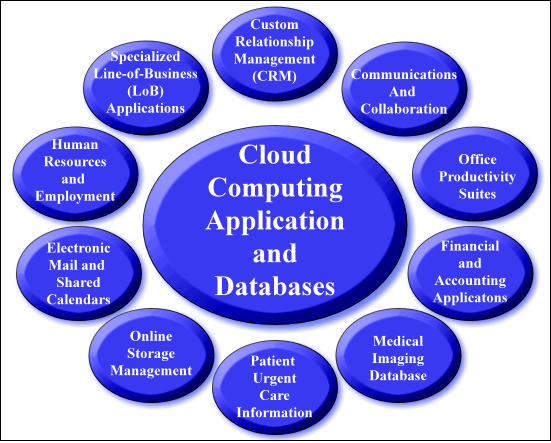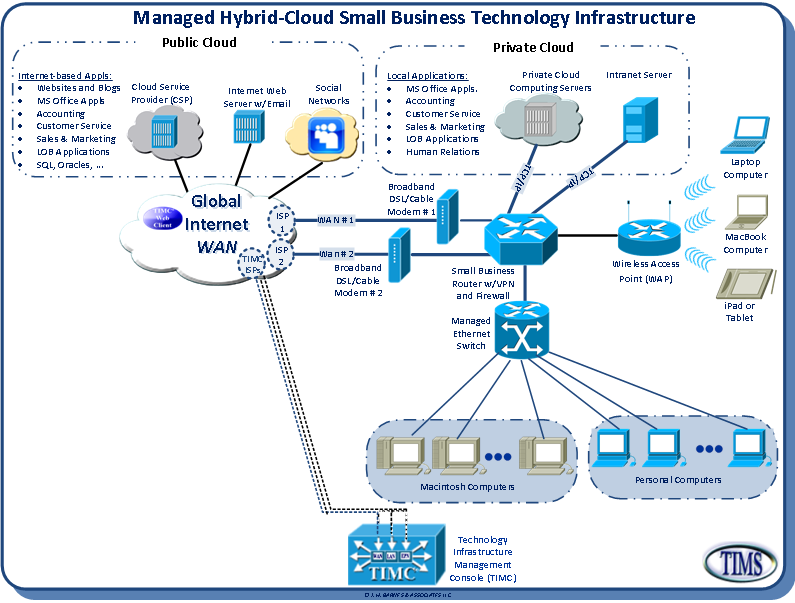Cloud Computing??? -
"Its All About the Internet!"
Cloud computing refers to
the process of delivering business-critical applications
and databases as a pay-as-you-go metered service. These services are
wholly dependent upon the Internet for
transport. The cloud computing process is
also known as:
- Software as a Service
(SaaS).
- Infrastructure as a
Service (IaaS).
- Platform as a Service
(PaaS).
Although cloud computing has existed for more
than twenty years, the cost of bandwidth made it
only assessable to large corporations. However,
the Internet has changed all that; and during
the past two years, Cloud Services Providers (CSPs) providing SaaS, IaaS, and PaaS have aggressively expanded
their offering into the small-to-medium
business (SMB) arena. If you are considering cloud computing for your small
business, it is critical that you that you first engage a firm that
has an in-depth understanding of the architecture
and "interworking" of the Internet such
as JHB&A. We will perform a comprehensive analysis of
your technology environment to ensure that it is capable of
supporting the complex networking and information processing
requirements of the Internet and cloud computing,
respectively.
"Cloud
computing along with our Managed Technology
Infrastructure Services offers small business
owners unparalleled opportunities to grow
their business without technology constraints!"
The unprecedented growth of the cloud
computing processing paradigm has been so overwhelming that during the next
five years, many of Line of Business (LOB) applications used by
small businesses will migrate from personal computers
and servers attached to the company's Local Area Network (LAN) to
Internet-based service providers:
-
Cloud Service Providers (CSPs),
-
Web Server Providers (WSPs) and ;
-
Social Networks Service Providers
(SNSPs).
Examples of Cloud Computing
Applications
|
 |
|
Cloud computing cover the gamut of today's small business applications
including:
-
Customer Relationship Management (CRM)
Applications such as SalesForce.
-
Business Contact Management (BCM)
Applications.
-
Email and Instant Messaging (IM)
Applications.
-
Business Accounting Systems such as
QuickBooks and Peachtree.
-
Office Productivity Applications such as
MS Office and Office 365.
-
Google Apps and Google Docs.
-
Line-of-Business Applications.
-
Online Storage Management.
-
Communications and Collaboration
Applications.
-
Medical Imaging and Urgent Care.
|
We will develop a "Cloud Computing Migration
Roadmap" for your Small Business that ensure that your Technology
Infrastructure and your Business Operations are not negatively
impacted during the migration.
Phase One of Cloud Computing Migration Roadmap:
Installing, Configuration, and Optimizing Your
Small Business Router
Many of today's small
businesses are totally unprepared for these new
metered-use business applications because they
currently have unmanaged ad hoc networks such as
the one shown in the diagram at the top left of
this page. Unfortunately, without changes to
their current technology infrastructure, these
businesses will not be able to take full
advantage of cloud computing applications. We
can provide a "complete migration roadmap" that
will ensure that your small business will
continue to meet the needs of your employees and
customers during the cloud migration phase. Our
cloud computing migration roadmap is not just
one, all encompassing move from your current ad
hoc networking environment, to a technology
infrastructure capable of supporting the
performance, availability and security
requirements of cloud computing applications and
databases: Our "roadmap" will ensure that your
current WAN router is capable of supporting the:
All of the above
features are included in small business routers
available from a variety of leading vendors
including Cisco, Netgear, D-Link, and others.
Phase Two of Cloud
Computing Migration Roadmap: Creating a
Hybrid Cloud Computing environment that support
both current Legacy applications and databases,
and new cloud-based applications and databases.
The following diagram illustrates the primary
components of this new managed hybrid cloud
computing environment:

One of the major advantages
of the Hybrid Cloud Computing Infrastructure is
that is enable a small business owner to run
applications on servers attached to the local
LAN or on the cloud service provider's servers,
and this greatly simplifies migration,
backup/recovery, and other business-related
issues.
We Offer Free Cloud Computing
Migration Support
If you do not have
answers to the above ten question, please call
us FIRST at (623) 979-1827!" We will perform a
free assessment of the cloud-readiness of your
current network and then suggest the things that
you need to consider before "you reach the point
of no return." Clearly, cloud computing is the
future of both small and mid-sized businesses,
and it is only a matter of time before you will
have to migrate some (or all) of your business
applications and databases to a cloud computing
architecture. Our Small-Business Technology
Infrastructure will enable you to be in full
control of the decision of when to migrate your
business applications and database into the
cloud computing environment.
|
|
"We Can Make Your
Technology Infrastructure
Cloud-eady in
Three
Days or Less!"
With little or no
up-front costs, we can convert your current ad
hoc network into a cloud-ready technology
infrastructure. This includes helping you select
the CSP that best meets your company's current
and future business requirements. As part of
this process, we will assist in the development
of a detail cloud computing migration plan that
ensure your current legacy applications and
databases will continue to meet the needs of
your business until your cloud computing
applications and databases are ready to be
placed online. Our cloud computing migration
plan includes all tasks required to successfully
complete the migration plus identify critical
performance and continuity requirements such as:
-
network-related
Service Level Agreements (SLAs),
-
traffic and activity
reporting requirements,
-
frequent
speed tests that measure responsiveness
of ISP and CSPs,
-
application and
database
backup & recovery,
-
disaster recovery planning, and;
-
business continuity
plans.
|